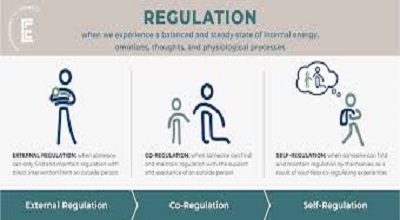Self-Regulation Strategies for Transitions
Self-regulation strategies can be highly effective in managing transitions and helping individuals adapt to new situations or changes in their lives. Transitions can be challenging, but with the right self-regulation techniques, you can navigate them more smoothly. Here are some strategies to consider:
Mindfulness and Self-Awareness:
- Begin by recognizing and acknowledging your feelings and reactions related to the transition.
- Practice mindfulness techniques, such as meditation and deep breathing, to stay present and reduce anxiety.
Goal Setting:
- Set clear and achievable goals for the transition. Break them down into smaller, manageable steps.
- Having goals provides a sense of direction and purpose during the transition.
Time Management:
- Create a schedule or timeline to help you allocate your time and resources effectively.
- Prioritize tasks and allocate more time for critical aspects of the transition.
Positive Self-Talk:
- Replace negative or self-doubting thoughts with positive affirmations and realistic self-talk.
- Encourage yourself with phrases like, “I can handle this” or “I’ve overcome challenges before.”
Social Support:
- Seek support from friends, family, or a therapist if necessary.
- Talking to others can provide valuable insights and emotional support during transitions.
Routine and Structure:
- Establish a daily routine or structure to maintain stability and a sense of normalcy.
- Consistency can help reduce anxiety and uncertainty.
Emotion Regulation:
- Practice emotional regulation techniques, such as journaling, to express and manage your emotions.
- Identify triggers and coping strategies for dealing with intense emotions.
Problem-Solving:
- Approach the transition as a problem-solving challenge.
- Break down complex issues into smaller problems and brainstorm potential solutions.
Self-Care:
- Prioritize self-care activities like exercise, healthy eating, and adequate sleep.
- A well-nourished and rested body and mind are better equipped to handle change.
Visualizations and Affirmations:
- Visualize a successful outcome of the transition and repeat positive affirmations related to it.
- This can help build confidence and reduce anxiety.
Flexibility and Adaptability:
- Accept that transitions often involve uncertainty and unexpected changes.
- Be open to adjusting your plans and expectations as needed.
Seek Professional Help:
- If the transition is particularly challenging or overwhelming, consider consulting a therapist or counselor who specializes in transitions and coping strategies.
Celebrate Progress:
- Acknowledge and celebrate small victories and milestones throughout the transition.
- Recognizing your progress can boost motivation and confidence.
Summary
Remember that self-regulation strategies may need to be tailored to your specific situation and personality. Experiment with different techniques to find what works best for you, and be patient with yourself as you navigate transitions. Additionally, seeking support from trusted individuals can be an essential part of successfully managing transitions in your life.
